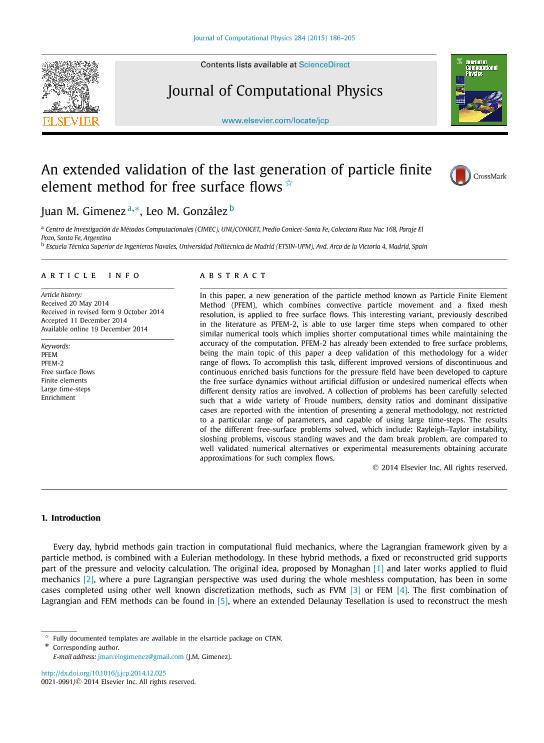Mostrar el registro sencillo del ítem
dc.contributor.author
Gimenez, Juan Marcelo

dc.contributor.author
Gonzalez, Leo Miguel

dc.date.available
2017-07-04T21:44:31Z
dc.date.issued
2014-12
dc.identifier.citation
Gimenez, Juan Marcelo; Gonzalez, Leo Miguel; An extended validation of the last generation of particle finite element method for free surface flows; Elsevier; Journal of Computational Physics; 284; 12-2014; 186-205
dc.identifier.issn
0021-9991
dc.identifier.uri
http://hdl.handle.net/11336/19560
dc.description.abstract
In this paper, a new generation of the particle method known as Particle Finite Element Method (PFEM), which combines convective particle movement and a fixed mesh resolution, is applied to free surface flows. This interesting variant, previously described in the literature as PFEM-2, is able to use larger time steps when compared to other similar numerical tools which implies shorter computational times while maintaining the accuracy of the computation. PFEM-2 has already been extended to free surface problems, being the main topic of this paper a deep validation of this methodology for a wider range of flows. To accomplish this task, different improved versions of discontinuous and continuous enriched basis functions for the pressure field have been developed to capture the free surface dynamics without artificial diffusion or undesired numerical effects when different density ratios are involved. A collection of problems has been carefully selected such that a wide variety of Froude numbers, density ratios and dominant dissipative cases are reported with the intention of presenting a general methodology, not restricted to a particular range of parameters, and capable of using large time-steps. The results of the different free-surface problems solved, which include: Rayleigh-Taylor instability, sloshing problems, viscous standing waves and the dam break problem, are compared to well validated numerical alternatives or experimental measurements obtaining accurate approximations for such complex flows.
dc.format
application/pdf
dc.language.iso
eng
dc.publisher
Elsevier

dc.rights
info:eu-repo/semantics/openAccess
dc.rights.uri
https://creativecommons.org/licenses/by-nc-nd/2.5/ar/
dc.subject
Pfem
dc.subject
Free Surface Flows
dc.subject
Enrichment
dc.subject
Large Time-Steps
dc.subject
Finite Elements
dc.subject
Pfem-2
dc.subject.classification
Ciencias de la Computación

dc.subject.classification
Ciencias de la Computación e Información

dc.subject.classification
CIENCIAS NATURALES Y EXACTAS

dc.subject.classification
Ingeniería Mecánica

dc.subject.classification
Ingeniería Mecánica

dc.subject.classification
INGENIERÍAS Y TECNOLOGÍAS

dc.title
An extended validation of the last generation of particle finite element method for free surface flows
dc.type
info:eu-repo/semantics/article
dc.type
info:ar-repo/semantics/artículo
dc.type
info:eu-repo/semantics/publishedVersion
dc.date.updated
2017-07-03T19:52:08Z
dc.journal.volume
284
dc.journal.pagination
186-205
dc.journal.pais
Países Bajos

dc.journal.ciudad
Amsterdam
dc.description.fil
Fil: Gimenez, Juan Marcelo. Consejo Nacional de Investigaciones Científicas y Técnicas. Centro Científico Tecnológico Conicet - Santa Fe. Centro de Investigaciones En Metodos Computacionales. Universidad Nacional del Litoral. Centro de Investigaciones En Metodos Computacionales; Argentina
dc.description.fil
Fil: Gonzalez, Leo Miguel. Universidad Politécnica de Madrid; España
dc.journal.title
Journal of Computational Physics

dc.relation.alternativeid
info:eu-repo/semantics/altIdentifier/doi/http://dx.doi.org/10.1016/j.jcp.2014.12.025
dc.relation.alternativeid
info:eu-repo/semantics/altIdentifier/url/http://www.sciencedirect.com/science/article/pii/S0021999114008420
Archivos asociados
